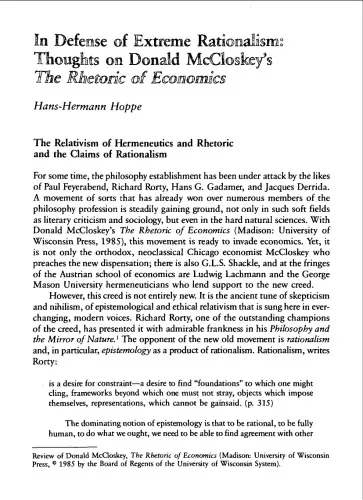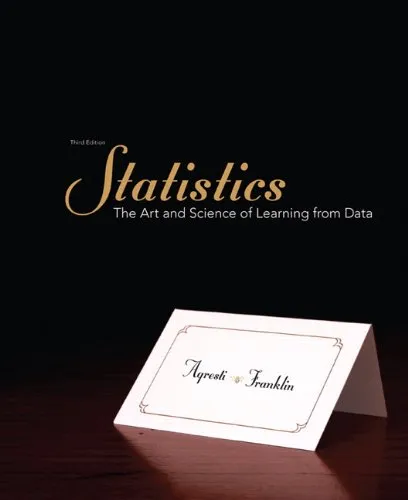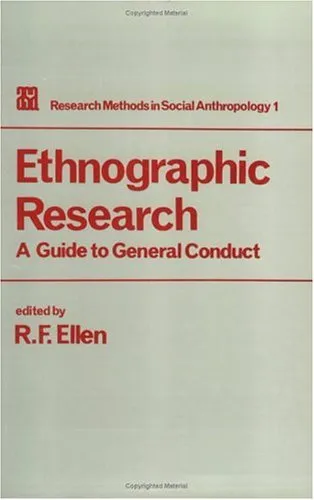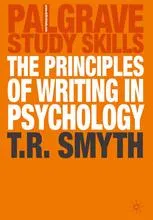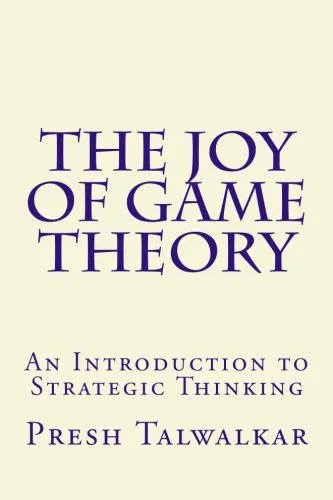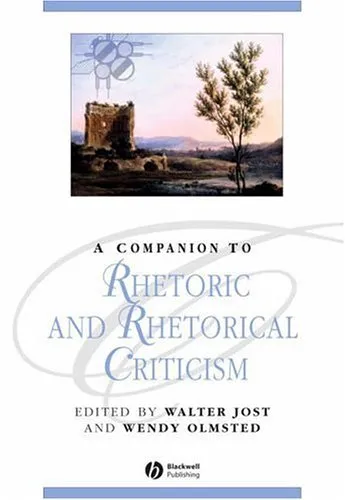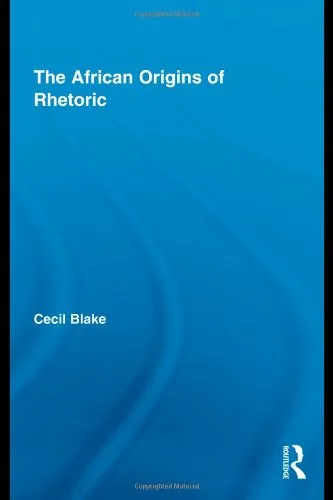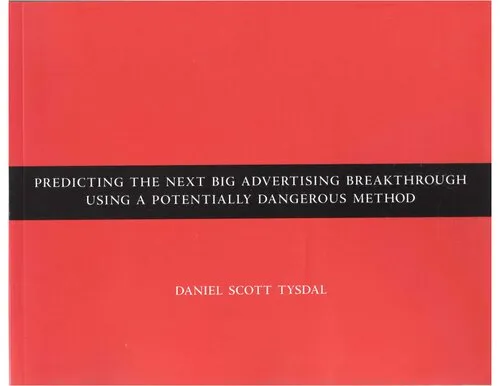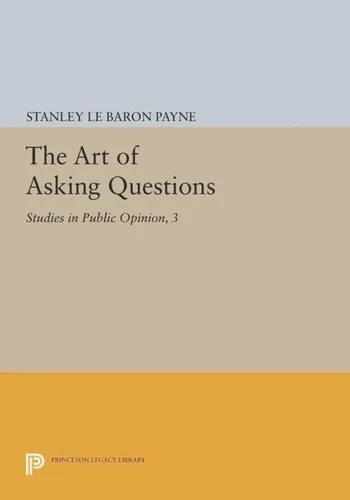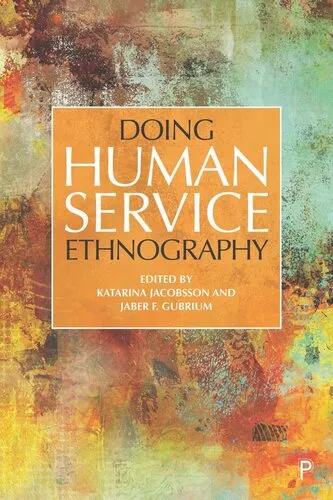In Defense of Extreme Rationalism - Thoughts on Donald McCloskey's The Rhetoric of Economics
4.5
Reviews from our users

You Can Ask your questions from this book's AI after Login
Each download or ask from book AI costs 2 points. To earn more free points, please visit the Points Guide Page and complete some valuable actions.Related Refrences:
Introduction to "In Defense of Extreme Rationalism - Thoughts on Donald McCloskey's The Rhetoric of Economics"
Written by Hans-Hermann Hoppe, "In Defense of Extreme Rationalism - Thoughts on Donald McCloskey's The Rhetoric of Economics" delves deep into the philosophical underpinnings of economic theory and the rhetoric used to justify and communicate its principles. Hoppe critiques and challenges Donald McCloskey's influential arguments presented in "The Rhetoric of Economics," offering an alternative perspective rooted in the tradition of rationalist epistemology and praxeological reasoning. The book inspires readers to engage with contemporary debates at the intersection of economics, philosophy, and rhetoric, offering fresh insights into methodology and truth in social sciences.
Hoppe is no stranger to rigorous intellectual discourse. As a staunch proponent of the praxeological methods pioneered by Ludwig von Mises, he argues for an approach to economics that prioritizes deductive reasoning over empirical observation. In this work, he highlights the dangers of over-reliance on rhetorical persuasion in economics, as suggested by McCloskey, and defends extreme rationalism as the only valid pathway to understanding economic principles. This intellectual battle between rationalism and rhetoric becomes the central focus of the book, making it a highly stimulating read for students of economics, philosophy, and critical thinking.
Beyond merely critiquing the ideas of Donald McCloskey, the book lays out a clear defense of praxeology, a method of economic analysis that Hoppe believes provides the most solid foundation for understanding human action. By contrasting extreme rationalism with the rhetorical methods favored by McCloskey, Hoppe illuminates the philosophical tensions at the heart of economic theory and debates. The result is a thought-provoking work that challenges readers to rethink their assumptions about the role of persuasion, reason, and logic in economic discourse.
Detailed Summary of the Book
A critique of rhetoric and a defense of reason in economics.
The book begins by examining McCloskey's central thesis: that economics is fundamentally a rhetorical practice, full of metaphors, narratives, and persuasive arguments. McCloskey argues that economists, like poets and novelists, use language creatively to communicate ideas and influence their audience. Hoppe does not dismiss the importance of rhetoric outright but takes issue with its centrality to McCloskey's worldview. Hoppe argues that such an emphasis on persuasion undermines the objective, rational nature of economic theory.
Hoppe's critique revolves around his commitment to the praxeological method, which sees economics as a deductive science derived from the fundamental axiom of human action. According to Hoppe, this approach ensures a firm epistemological foundation for economic theory. Throughout the book, he contrasts this rationalist methodology with McCloskey's rhetoric-focused approach, exposing what he perceives as its philosophical and methodological weaknesses.
As the book progresses, Hoppe expands his analysis to broader themes concerning the philosophy of science, epistemology, and the role of language in human cognition. By tying these themes back to economics, Hoppe provides a holistic argument that places praxeology at the forefront of serious intellectual inquiry, ensuring the discipline retains its rigor and objectivity.
Key Takeaways
- Economic theory must rest on a firm rationalist foundation based on deductive reasoning.
- McCloskey's rhetorical approach risks transforming economics into a discipline focused more on persuasion than truth.
- Praxeology offers a superior framework for understanding human action, as it is rooted in undeniable axioms rather than empirical contingencies.
- The debate between rationalism and rhetoric has significant implications for the methodology and credibility of the social sciences.
Famous Quotes from the Book
"To abandon rationalist deduction in favor of rhetorical persuasion is to abandon truth for power."
"Praxeology is not merely a method of economics; it is the only method through which we can derive economic laws as apodictically certain."
"A rhetorical approach to economics may charm its audience, but it also risks undermining the discipline's scientific integrity."
Why This Book Matters
A vital contribution to debates on economic methodology and philosophy.
"In Defense of Extreme Rationalism" is not just a book for academics; it is a call to action for anyone concerned about the state of intellectual discourse in the social sciences. By defending the rationalist approach, Hoppe ensures that economics remains grounded in reason and truth, rather than falling prey to the whims of rhetorical persuasion and fashion. In an era where relativism and subjectivity seem to dominate intellectual debates, Hoppe's firm commitment to deductive reasoning provides a refreshing counterpoint.
For students of economics, philosophy, and epistemology, this book is an essential read. It does not shy away from tough questions or controversial ideas; instead, it invites readers to critically assess their own assumptions about reason, logic, and science. Whether you agree with Hoppe's conclusions or not, his arguments are sure to leave a lasting impression on your understanding of economic theory and its methodological foundations.
Free Direct Download
You Can Download this book after Login
Accessing books through legal platforms and public libraries not only supports the rights of authors and publishers but also contributes to the sustainability of reading culture. Before downloading, please take a moment to consider these options.
Find this book on other platforms:
WorldCat helps you find books in libraries worldwide.
See ratings, reviews, and discussions on Goodreads.
Find and buy rare or used books on AbeBooks.
1268
بازدید4.5
امتیاز50
نظر98%
رضایتReviews:
4.5
Based on 0 users review
"کیفیت چاپ عالی بود، خیلی راضیام"
Questions & Answers
Ask questions about this book or help others by answering
No questions yet. Be the first to ask!
